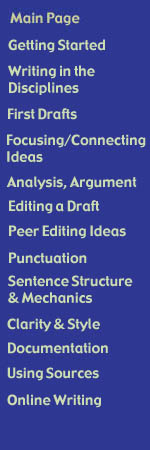

Some Warning Signs of a Rushed Paper
(printable version here)
This checklist notes some characteristics of writing done in one draft and at the last minute. Watch for these symptoms of hurried writing; your professor will certainly notice them!
- Not following the assignment: This characteristic is a clue that you didn't spend much time thinking about your work or referring to your assignment sheet (when you read an assignment, use the same tactics you would for analyzing a question on an essay test).
- Glaring factual errors: Such errors show that you didn't proofread your paper or that you rushed through your reading and didn't fully understand it. (ex. "Kate Chopin was a British writer..."; "The Civil War took place in the 1820s. . . ")
- Failing to cite sources: It will look as though you are plagiarizing, which amounts to stealing. Carelessness and time constraints are not excuses.
- Incomplete thesis: Stating that "A and B are different" is not enough for a thesis statement. You should also include in that statement why or how A & B are different.
- Conclusion that states what thesis should have: If the final paragraph states your reasons for contrasting two ideas, for example, then that information should have been included in your thesis statement, not at the end of the paper. A reader needs to have some sense of direction as he or she reads. A thesis at the end of your work indicates that you just discovered your reasons for writing; you could have revised your paper so that it included this important information at the beginning. See our information about conclusions for help.
- Thesis isn't followed through in the paper: If your thesis states that you are going to discuss ideas such as mechanization and technology and you never have a single paragraph about the ideas, then the thesis is inappropriate. You didn't plan your paper so that you knew what you were going to discuss. Worse yet, you didn't read over your introduction to check that you followed through with the ideas you initially presented.
- Several paragraphs with nearly identical topic sentences: You don't know where your paper is going and you didn't read your work. See our entry about writing effective paragraphs for help.
- Last page or so is incoherent and sloppy: In such cases there will be a big difference in language and sentence structure at the end of your work. The end isn't on the level with the paper's beginning. Reading your work aloud is a good way to check for coherence; reading aloud also takes some time and forces you to examine your work more closely than you may if you read silently.
- Lack of paragraphing at the end of your paper: You were racing to the end.
- Incomplete argument: If you said you were going to discuss four books and you only got around to two of them, you were obviously rushed and didn't plan ahead.
- Pages of "is/are" verbs and few action verbs: These are easy to revise; if you can't see them, get a friend to check your work. See Adding Action and Clarity to Writing for help.
- Agreement problems: Check to make sure that your tenses don't shift from the present to the past tense, for example. Try to be consistent. Also be sure that your subjects and verbs agree. See Subject-Verb Agreement for help.
- Numerous spelling errors: If you have a computer with a spell checker, use it! Even if you have a spell-checker, have another person read your essay for small errors. You might have entered an incorrect spelling in your spell checker!
- Sloppy presentation: Be sure that your paper looks as polished as possible; staple or paper clip your work together. Many professors do not want papers submitted in fancy binders and plastic covers, but you should check first.
The pages should be numbered, and your name should be typed on your paper. You may want to start with a formal title page from The MLA Handbook, The APA Manual, (or another handbook); check with your professor about a system of documentation appropriate for the class. The Boatwright library has copies of The MLA Handbook, Publication Manual of the APA, and Kate Turabian's A Manual for Writers on permanent reserve.
Back to 'Editing a Draft'
Writer's Web | Writing Center | Make
an Appointment | Library
Copyright Info